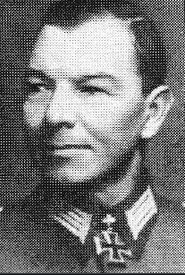Bartl, Leopold
- Date of birth:
- March 31st, 1902 (Rehberg/Lower Austria, Austria)
- Date of death:
- April 4th, 1980 (Krems/Lower Austria, Austria)
- Nationality:
- Austrian
Biography
Promotions
00/1925: Soldat
03/1938: Feldwebel
00/1939: Stabswachtmeister
09/1939: Leutnant
01/1940: Oberleutnant
11/1941: Hauptmann
06/1943: Major
In 1938 Bartl joined the German Wehrmacht with the rank of sergeant and, after appropriate training, was promoted to lieutenant in the 86th Pioneer Battalion.
In the Poland campaign he took part as chief of the 2nd / Pioneer Battalion 70 and proved himself in various missions.
At the beginning of 1942 the battalion was thrown into the battle for Sevastopol and took part in the heavy trench warfare and bunker battles. He saw the end of the fighting in the summer of 1942 as an officer zbV. on the staff after being wounded twice himself.
After a battalion leader course in Dessau, Bartl took command of the 335 Engineer Battalion in 1942.
Relocated to the Eastern Front in the spring of 1943, Bartl gained a high reputation during the operations near Voroshilovgrad. Bartl became commander of the 335 Pioneer Battalion on November 6, 1943
awarded the Knight's Cross. This is followed by missions at Uman, Nikopol and Nikolajew, where he was wounded several times.
In April 1944 he received a teaching command at the Pioneer School in Breslau and in the summer of 1944 took over command of the Pioneer Regimental Staff zbV. 516.
Then the heavy defensive battles followed in eastern Poland, in November 1944 he set up the Pioneer Brigade 42 with the operations
in the area of the 9th Army in Poland and in the Halbe pocket. There he was taken prisoner by the Soviets in May 1945, from which he was released in 1947. In 1956, Bartl signed up for the 2nd Austrian Armed Forces to be accepted into the active officer corps.
This application remained unsuccessful, however, and Bartl was employed as a civil servant in the army, where he was initially involved in setting up the Klosterneuburg pioneering tool factory.
He then worked as a technical consultant for the engineer force in the weapons and equipment department in the Ministry of Defense, where he was also promoted to specialist inspector.
In 1966 he went into well-deserved retirement as a lawyer.
Do you have more information about this person? Inform us!
- Period:
- Second World War (1939-1945)
- Awarded on:
- 1939
- Period:
- Second World War (1939-1945)
- Awarded on:
- 1940
- Period:
- Second World War (1939-1945)
- Rank:
- Oberleutnant (1st Lieutenant)
- Unit:
- 2. Kompanie, Pionier-Bataillon 70, 11. Armee
- Awarded on:
- February 14th, 1942
- Period:
- Second World War (1939-1945)
- Rank:
- Major
- Unit:
- Kommandeur, Pionier-Bataillon 335, 335. Infanterie-Division
- Awarded on:
- November 6th, 1943
- Period:
- Second World War (1939-1945)
- Awarded on:
- August 28th, 1942
- Period:
- Second World War (1939-1945)
- Period:
- Second World War (1939-1945)
- Awarded on:
- 1943
- Period:
- Second World War (1939-1945)
- Awarded on:
- 1941
- Period:
- Second World War (1939-1945)
- Awarded on:
- 1943
- Period:
- Second World War (1939-1945)
- Awarded on:
- 1942
- Period:
- Second World War (1939-1945)
- Awarded on:
- 1942
Sources
- Photo 1:
- - FELLGIEBEL, W.P., Elite of theThird Reich, Helion & Company Limited, Solihull, 2003.
- SCHERZER, VEIT, Die Ritterkreuzträger der Deutschen Wehrmacht 1939-1945, Biblio Verlag, Bissendorf, 2010.
- http://www.ritterkreuztraeger.info/rk/b/B089Bartl-Leopold.pdf
- Die Träger des Deutschen Kreuzes













